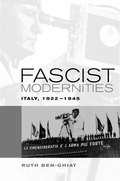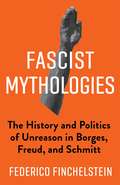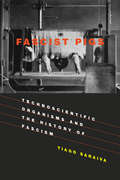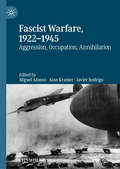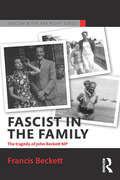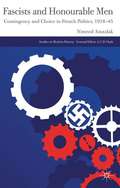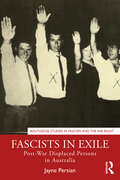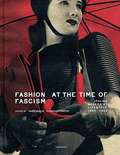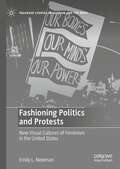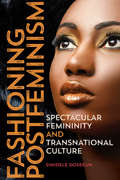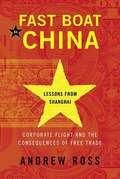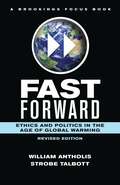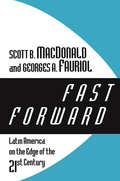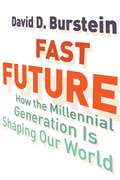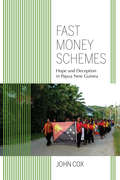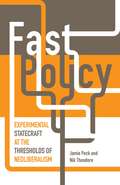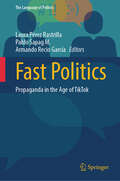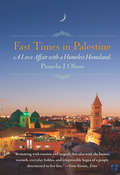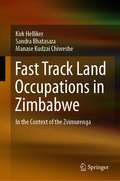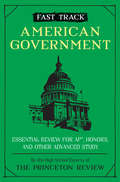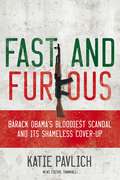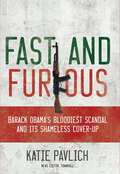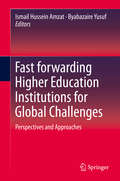- Table View
- List View
Fascist Italy and the Middle East, 1933–40
by Nir ArielliAn examination of why and how Fascist Italy sought to increase its influence in the Middle East, and why Italian efforts ultimately failed. Offering fresh insights into Fascist Italy's foreign and colonial policies, this book makes an important contribution to the complex history of relations between Europe and the Arab world.
Fascist Modernities: Italy, 1922-1945
by Ruth Ben-GhiatIn contrast to the widely held view that Italian fascism did not have a coherent program, Ben-Ghiat argues that the political situation was used as "an opportunity to create a peculiarly Italian and fascist mass culture celebrating order, hierarchy, and national uniqueness."
Fascist Mythologies: The History and Politics of Unreason in Borges, Freud, and Schmitt (New Directions in Critical Theory #79)
by Federico FinchelsteinFor fascism, myth was reality—or was realer than the real. Fascist notions of the leader, the nation, power, and violence were steeped in mythic imagery and the fantasy of transcending history. A mythologized primordial past would inspire the heroic overthrow of a debased present to achieve a violently redeemed future. What is distinctive about fascist mythology, and how does this aspect of fascism help explain its perils in the past and present?Federico Finchelstein draws on a striking combination of thinkers—Jorge Luis Borges, Sigmund Freud, and Carl Schmitt—to consider fascism as a form of political mythmaking. He shows that Borges’s literary and critical work and Freud’s psychoanalytic writing both emphasize the mythical and unconscious dimensions of fascist politics. Finchelstein considers their ideas of the self, violence, and the sacred as well as the relationship between the victims of fascist violence and the ideological myths of its perpetrators. He draws on Freud and Borges to analyze the work of a variety of Latin American and European fascist intellectuals, with particular attention to Schmitt’s political theology. Contrasting their approaches to the logic of unreason, Finchelstein probes the limits of the dichotomy between myth and reason and shows the centrality of this opposition to understanding the ideology of fascism.At a moment when forces redolent of fascism cast a shadow over world affairs, this book provides a timely historical and critical analysis of the dangers of myth in modern politics.
Fascist Pigs: Technoscientific Organisms and the History of Fascism (Inside Technology)
by Tiago SaraivaHow the breeding of new animals and plants was central to fascist regimes in Italy, Portugal, and Germany and to their imperial expansion. In the fascist regimes of Mussolini's Italy, Salazar's Portugal, and Hitler's Germany, the first mass mobilizations involved wheat engineered to take advantage of chemical fertilizers, potatoes resistant to late blight, and pigs that thrived on national produce. Food independence was an early goal of fascism; indeed, as Tiago Saraiva writes in Fascist Pigs, fascists were obsessed with projects to feed the national body from the national soil. Saraiva shows how such technoscientific organisms as specially bred wheat and pigs became important elements in the institutionalization and expansion of fascist regimes. The pigs, the potatoes, and the wheat embodied fascism. In Nazi Germany, only plants and animals conforming to the new national standards would be allowed to reproduce. Pigs that didn't efficiently convert German-grown potatoes into pork and lard were eliminated.Saraiva describes national campaigns that intertwined the work of geneticists with new state bureaucracies; discusses fascist empires, considering forced labor on coffee, rubber, and cotton in Ethiopia, Mozambique, and Eastern Europe; and explores fascist genocides, following Karakul sheep from a laboratory in Germany to Eastern Europe, Libya, Ethiopia, and Angola. Saraiva's highly original account—the first systematic study of the relation between science and fascism—argues that the “back to the land” aspect of fascism should be understood as a modernist experiment involving geneticists and their organisms, mass propaganda, overgrown bureaucracy, and violent colonialism.
Fascist Warfare, 1922–1945: Aggression, Occupation, Annihilation
by Alan Kramer Javier Rodrigo Miguel AlonsoThis groundbreaking book explores the interpretative potential and analytical capacity of the concept ‘fascist warfare’. Was there a specific type of war waged by fascist states? The concept encompasses not only the practice of violence at the front, but also war culture, the relationship between war and the fascist project, and the construction of the national community. Starting with the legacy of the First World War and using a transnational approach, this collection presents case studies of fascist regimes at war, spanning Nazi Germany, Fascist Italy, Francoist Spain, Croatia, and Imperial Japan. Themes include the idea of rapid warfare as a symbol of fascism, total war, the role of modern technology, the transfer of war cultures between regimes, anti-partisan warfare as a key feature, and the contingent nature and limits of fascist warfare.
Fascist in the Family: The Tragedy of John Beckett M.P. (Routledge Studies in Fascism and the Far Right)
by Francis BeckettJohn Beckett was a rising political star. Elected as Labour's youngest M.P. in 1924, he was constantly in the news and tipped for greatness. But ten years later he was propaganda chief for Mosley’s fascists, and one of Britain’s three best known anti-Semites. Yet his mother, whom he loved, was a Jew. Her ancestors were Solomons, Isaacs and Jacobsons, originally from Prussia. He successfully hid his Jewish ancestry all his life – he said his mother’s family were "fisher folk from the east coast." His son, the author of this book, acclaimed political biographer and journalist Francis Beckett, did not discover the truth until John Beckett had been dead for years. He left Mosley and founded the National Socialist League with William Joyce, later Lord Haw Haw, and spent the war years in prison, considered a danger to the war effort. For the rest of his life, and all of Francis Beckett’s childhood, John Beckett and his family were closely watched by the security services. Their devious machinations, traced in records only recently released, damaged chiefly his young family. This is a fascinating and brutally honest account of a troubled man in turbulent times.
Fascists and Honourable Men
by Nimrod AmzalakWas France fascist in the interwar period? This comprehensive historical, political and sociological account follows the rise of engineers and political "non-conformists" in the first half of the twentieth century, examining the French technocracy's relationship with the rise of fascism in France and later the establishment of the Fourth Republic.
Fascists in Exile: Post-War Displaced Persons in Australia (Routledge Studies in Fascism and the Far Right)
by Jayne PersianFascists in Exile tells the extraordinary story of the war criminals, collaborators and fascist ultranationalists who were resettled in Australia by the International Refugee Organisation between 1947 and 1952. It explores the far-right backgrounds and continuing political activism of these displaced persons in Australia, adding to our knowledge of the development of Australian anti-communism in the 1950s. These individuals argued that they had been caught between National Socialism and Soviet communism. What might that have meant for their migration and resettlement trajectories? Beyond ‘Nazi-hunting,’ what can this tell us about the challenge they posed to international and national forms, both in Europe and in Australia? This book demonstrates that fascist ideation could not only survive the war’s end but that it continued to be transnational and transcultural. At the same time, anti-fascist protests and then the war crimes investigations of the late 1980s exposed problematic pasts, a legacy with which Australia is still reckoning. The text will appeal to those with an interest in the far right, Australian migration and refugee issues.
Fashion Fun: Book 9 (Secret Princesses #9)
by Rosie BanksA gorgeous new series about magical princesses and best friends. This book is a special long adventure for even more magical fun! Best friends Charlotte and Mia can't bear it when Charlotte's family moves far away. But when they become trainee Secret Princesses they begin an amazing adventure together - and they can see each other whenever they like!Mean Princess Poison has cast a spell on four of the Secret Princesses and made them forget all about their magic. Meanwhile Lena wishes that she could win a fashion show. Can Charlotte and Mia help make Lena's dreams come true AND remind Princess Sophie what real magic really is?Plus collect the tokens for a exclusive Best Friends necklace designed by Monsoon!**while stocks last
Fashion at the Time of Fascism: Italian Modernist Lifestyle Between, 1922-1943
by Mario Lupano Alessandra VaccariThe first visual history of Modernist Italian fashion during Benito Mussolini's Fascist regime, and the product of immense research, Fashion at the Time of Fascism charts the fashion industry's ambivalent negotiation of international couture and the bizarre dictates of Fascism, and the legacy of this era in shaping today's fashion industry. Authors Mario Lupano and Alessandra Vaccari explore and compare a huge range of forgotten archival sources, such as women's glossies, fashion, film and gossip magazines, photo archives, exhibition and commercial catalogues, books, manuals and magazines on tailoring, dressmaking, design and architecture, and corporate and government journals. This abundance of materials is presented in a fluid sequence of image and text that charts the rhythms, rituals and lifestyles of the typical Italian day through the four basic themes of "Measurements," "Model," "Brand" and "Parade." Each section includes texts that highlight the key figures and phases in Italian fashion, from the 1920s to the early 1940s, juxtaposing them with Modernism's broader salient themes and emphasizing the conscious use of glamour in the regime's super-choreographed portrayal of itself. Fashion at the Time of Fascism is further enriched by a thorough iconographic index and a detailed reference list, making the volume a revelation for both general readers and scholars.
Fashioning Politics and Protests: New Visual Cultures of Feminism in the United States (Palgrave Studies in Fashion and the Body)
by Emily L. NewmanThrough meticulous examinations, this book analyzes how women update their identities and articulate their feelings through clothing and art in protests, politics in the United States in the 20th century. Topics explored include the suffragists and their impact on contemporary art, the significance of the red dress in both The Handmaid’s Tale and the Missing and Murdered Indigenous Women movement, the impact of the Miss America protests, the rising popularity of the pantsuit for women, the recent dominance of the pussyhat, and the way that feminist slogans are disseminated on t-shirts. Movements discussed include craftivism, hashtag culture, feminism, the CROWN act, Pantsuit Nation, socially-committed stores, and more. Interdisciplinary and intersectional at its core, addressing numerous areas, including fashion, sociology, visual culture, art history, feminism, and popular culture; Fashioning Politics and Protests uncovers how women continue to use visual means, explored via their clothing, to change the world.
Fashioning Postfeminism: Spectacular Femininity and Transnational Culture (Dissident Feminisms #33)
by Simidele DosekunWomen in Lagos, Nigeria, practice a spectacularly feminine form of black beauty. From cascading hair extensions to immaculate makeup to high heels, their style permeates both day-to-day life and media representations of women not only in a swatch of Africa but across an increasingly globalized world. Simidele Dosekun's interviews and critical analysis consider the female subjectivities these women are performing and desiring. She finds that the women embody the postfeminist idea that their unapologetically immaculate beauty signals—but also constitutes—feminine power. As empowered global consumers and media citizens, the women deny any need to critique their culture or to take part in feminism's collective political struggle. Throughout, Dosekun unearths evocative details around the practical challenges to attaining their style, examines the gap between how others view these women and how they view themselves, and engages with ideas about postfeminist self-fashioning and subjectivity across cultures and class. Intellectually provocative and rich with theory, Fashioning Postfeminism reveals why women choose to live, embody, and even suffer for a fascinating performative culture.
Fast Boat to China
by Andrew RossMost Americans today are aware that jobs are being outsourced to China, India, and other nations at an alarming rate. From factory jobs to white-collar, high-tech positions, the exporting of labor is one of the most controversial issues in America. Yet few people know much about the other end — about the people who are actually working these jobs and how their own lives have been throw into tumult by these new economic forces. Andrew Ross spent a year in China, interviewing local employees and their ...
Fast Forward
by Strobe Talbott William AntholisFast Forward is equal parts science primer, history lesson, policy prescription, and ethical treatise. This pithy and compelling book makes clear what we know and don't know about global warming; why the threat demands prudent and urgent action; why the transition to a low-carbon economy will be the most difficult political and economic transaction in history; and how it requires nothing less than a revolution in our sense of civic responsibility. William Antholis and Strobe Talbott guide the reader through two decades of climate change politics and diplomacy, explaining the national and international factors that have influenced and often impeded domestic climate legislation and global negotiations. Recent United Nations-sponsored summits have demonstrated that the world cannot wait for a binding global treaty. Instead, the authors believe that the "Big Four" of America, the European Union, China, and India must lead the way forward. They recommend a new international mechanism modeled on the General Agreement on Tariffs and Trade that would monitor national commitments and create incentives for other countries to coordinate their efforts to cut emissions.Antholis and Talbott put their recommendations for legislative and diplomatic action into the larger context of our obligation to future generations, echoing a theme stressed by a diverse coalition of religious leaders calling for ambitious action on climate change. The world we leave to our children and grandchildren is not an abstraction, or even just a legacy; we must think about what kind of world that will be in deciding how we live-and act-today.
Fast Forward: Latin America on the Edge of the 21st Century
by Scott B. MacDonaldLatin America is developing rapidly. As the authors see the region, a small group of countries has found a fast-forward button. In these countries change is exciting, occurring at such a rapid pace that a major breakthrough hi economic growth appears within grasp. After an almost decade-long period of recession and stagnation, many Latin American economies now have elected governments. With a few exceptions, most have also improved their socioeconomic conditions beyond meeting basic human needs. Yet few North Americans or Europeans are aware of these advances. How does Latin America fit into the changing world in the 1990s, and why should someone living in the United States, Europe, or developed parts of the Pacific Basin care?Fast Forward shows that Latin America's economic renaissance clearly has implications for a post-Cold War world order. Latin America is starting to make important contributions, particularly in the areas of international diplomacy, economics, and culture. Collectively, Latin Americans now demonstrate a coherent collective will about where they wish to take themselves. This does not mean that U.S. influence in the Americas will soon disappear, but that new challenges in the international system will force greater equity in Western Hemisphere relationships.While Latin America in the 1990s offers much to be excited about, the authors caution that there are dangers in being too enthusiastic. The always-present potential for top-down authoritarian approaches must temper enthusiasm about a better Latin American future. Despite this, the authors see a well-defined departure from past economic modes occurring and the potential for a higher level of development for some countries. This book is for economists, sociologists, and political scientists interested in economic and political development, and researchers interested in Latin America in particular.
Fast Future: How the Millennial Generation Is Shaping Our World
by David D. BursteinA millennial examines how his generation is profoundly impacting politics, business, media, and activismThey've been called trophy kids, entitled, narcissistic, the worst employees in history, and even the dumbest generation. But, argues David Burstein, the millennial generation's unique blend of civic idealism and savvy pragmatism will enable us to overcome a deeply divided nation facing economic and environmental calamities.With eighty-million millennials (people who are today eighteen to thirty years old) coming of age and emerging as leaders, this is the largest generation in U.S. history, and, by 2020, its members will represent one out of every three adults. They are more ethnically and racially diverse than their elders and have begun their careers at a time when the recession has set back the job market. Yet they remain optimistic about their future and are deeply connected to one another. Drawing on extensive interviews with his millennial peers and compelling new research, Burstein illustrates how his generation is simultaneously shaping and being shaped by a fast-paced and fast-changing world.Part oral history, part social documentary, Fast Future reveals the impact and story of the millennial generation--in its own words.
Fast Money Schemes: Hope and Deception in Papua New Guinea (Framing the Global)
by John CoxIn the late 1990s and early 2000s a wave of Ponzi schemes swept through Papua New Guinea, Australia, and the Solomon Islands. The most notorious scheme, U-Vistract, attracted many thousands of investors, enticing them with promises of 100 percent interest to be paid monthly. Its founder, Noah Musingku, was a charismatic leader who promoted the scheme as a form of Christian mission and as the basis for establishing an independent kingdom. Fast Money Schemes uses in-depth interviews with investors, newspaper accounts, and participant observation to understand the scheme's appeal from the point of view of those who invested and lost, showing that organizers and investors alike understood the scheme as a way of accessing and participating in a global economy. John Cox delivers a "post-village" ethnography that gives insight into the lives of urban, middle-class Papua New Guineans, a group that is not familiar to US readers and that has seldom been a focus of anthropological interest. The book's concern with understanding the interweaving of morality, finance, and aspirations shared by a global cosmopolitan middle class has wide resonance beyond studies of Papua New Guinea and anthropology.
Fast Policy: Experimental Statecraft at the Thresholds of Neoliberalism
by Jamie Peck Nik TheodoreWe inhabit a perpetually accelerating and increasingly interconnected world, with new ideas, fads, and fashions moving at social-media speed. New policy ideas, especially &“ideas that work,&” are now able to find not only a worldwide audience but also transnational salience in remarkably short order. Fast Policy is the first systematic treatment of this phenomenon, one that compares processes of policy development across two rapidly moving fields that emerged in the Global South and have quickly been adopted worldwide⎯conditional cash transfers (a social policy program that conditions payments on behavioral compliance) and participatory budgeting (a form of citizen-centric urban governance). Jamie Peck and Nik Theodore critically analyze the growing transnational connectivity between policymaking arenas and modes of policy development, assessing the implications of these developments for contemporary policymaking. Emphasizing that policy models do not simply travel intact from sites of invention to sites of emulation, they problematize fast policy as a phenomenon that is real and consequential yet prone to misrepresentation. Based on fieldwork conducted across six continents and in fifteen countries, Fast Policy is an essential resource in providing an extended theoretical discussion of policy mobility and in presenting a methodology for ethnographic research on global social policy.
Fast Politics: Propaganda in the Age of TikTok (The Language of Politics)
by Laura Pérez Rastrilla Pablo Sapag M. Armando Recio GarcíaThe goal of this book is to show the role of TikTok as a tool for political purposes. To this end, the authors analyse the messages posted on this social medium by political figures and institutions such as politicians and political parties, their impact on political landscapes, as well as the transformation of political communication techniques in order to suit the platform’s features. In the last two years, the exponential growth of TikTok has led an increasing number of politicians and institutions to incorporate it into their communication strategies. The platform displays some very different features from other social media that determine the way in which the content is presented. In addition, it manages to reach an audience that normally does not access or share political messages.Within this context, the volume pursues two main objectives. First, to examine how the communication techniques and the peculiarities of this social medium – where short videos with actors in informal attitudes prevail – affect the political message. A second objective is to analyse the influence of the messages distributed through TikTok that redefine political scenarios, and of the relationships of politicians and parties with voters. The core of the book comprises case studies that are organised into three parts, with nine chapters in all.The authors are scholars and practitioners of political communication, with diverse geographical representation, who approach the topics from a range of methodological perspectives. The first part addresses the state of the art and the influence of TikTok features on the way political communication is performed. The second part discusses the influence of TikTok on electoral scenarios and political culture in India, Bangladesh, the United States, and Ecuador. Finally, in the third part, TikTok is analysed as an instrument for promoting far right politicians and parties in Europe, as in the case of Matteo Salvini in Italy, and AfD in Germany and Vox in Spain.The volume is oriented to both scholars and communication professionals, such as journalists, communication consultants, and speechwriters, who want to become familiar with the platform, learn about its political impact, or wish to deepen their understanding of transformations in communication techniques and their adaptation to this growing social medium.
Fast Times in Palestine: A Love Affair with a Homeless Homeland
by Pamela J. OlsonFor much of her life--like many Westerners--most of what Pamela Olson knew of the Middle East was informed by headlines and stereotypes. But when she traveled to Palestine in 2003, she found herself thrown with dizzying speed into the realities of Palestinian life.Fast Times in Palestine is Olson's powerful, deeply moving account of life in Palestine--both the daily events that are universal to us all (house parties, concerts, barbecues, and weddings) as well as the violence, trauma, and political tensions that are particular to the country. From idyllic olive groves to Palestinian beer gardens, from Passover in Tel Aviv to Ramadan in a Hamas village, readers will find Olson's narrative both suspenseful and discerning. Her irresistible story offers a multi-faceted understanding of the Palestinian perspective on the Israel-Palestine conflict, filling a gap in the West's understanding of the difficult relationship between the two nations.At turns funny, shocking, and galvanizing, Fast Times in Palestine is a gripping narrative that challenges our ways of thinking--not only about the Middle East, but about human nature, cultural identity, and our place in the world.
Fast Track Land Occupations in Zimbabwe: In the Context of the Zvimurenga
by Kirk Helliker Manase Kudzai Chiweshe Sandra BhatasaraThis book offers the first detailed scholarly examination of the nation-wide land occupations which spread across the Zimbabwean countryside from the year 2000, and led to the state’s fast track land reform programme. In an innovative way, it highlights the decentralized character of the occupations by recognizing significant spatial variation around a number of key themes, including historical memory, modes of mobilization and gender. A case study of the land occupations in Mashonaland Central Province, based on original research, adds empirical weight to the argument. In further identifying and understanding the specificities and complexities of the land occupations, the book also frames them by way of a nuanced comparative-historical analysis of the three zvimurenga. It thus examines the land occupations (referred to, likely controversially, as the ‘third chimurenga’) with reference to the original anti-colonial revolt from the 1890s (the first chimurenga) and the war of liberation in the 1970s (the second chimurenga). Further, the book engages critically with the ruling party’s chimurenga narrative and the hegemonic understanding of the land occupations within Zimbabwean studies. This book is a crucial read for all scholars and students of post-2000 land and politics in Zimbabwe, but also for those more broadly interested in historical-comparative analyses of land struggles in Zimbabwe and beyond.
Fast Track: Essential Review for AP, Honors, and Other Advanced Study (High School Subject Review)
by The Princeton ReviewGET UP TO SPEED WITH FAST TRACK: AMERICAN GOVERNMENT! Covering the most important material taught in high school government classes, this essential review book gets readers on the fast track to class success, with critical information presented in an easy-to-follow quick-study format!Inside this book, you'll find:• Clear, concise summaries of the most important concepts, institutions, and policies covered in U.S. government & politics, social studies, and civics classes• Diagrams, charts, and graphs for quick visual reference• Easy-to-follow content organization and illustrationsWith its friendly, straightforward approach and a clean, colorful modern design crafted to appeal to visual learners, this guidebook is perfect for catching up in class or getting ahead on exam review.Topics covered in Fast Track: American Government include:• Constitutional underpinnings• Federalism• Public opinion• Voting and polling• The effects of mass and social media• Electoral laws and systems• Political parties, interest groups, and PACs• The branches of government• The legislative process• Civil rights and civil liberties• The U.S. criminal justice system... and more!
Fast and Furious: Barack Obama's Bloodiest Scandal and Its Shameless Cover-up
by Katie PavlichA BLOODY SCANDAL AND ITS SHAMELESS COVER-UP. No scandal is more threatening to the Obama administration than Operation Fast and Furious. While other scandals involve money, Fast and Furious involves lives, including that of Border Patrol Agent Brian Terry, gunned down with a weapon that the federal government put in the hands of Mexico's narco-terrorists. As shocking as Operation Fast and Furious was--and this book explains, in chilling detail, just what this operation conducted by the ATF, under the supervision of the Justice Department, entailed--equally appalling is the blatant cover-up of wrongdoing by the Obama administration. No reporter has been more dogged in tracking down the facts about Fast and Furious than Katie Pavlich. In her stunning new book she reveals: » The documents that undermine the White House's claims of ignorance about Fast and Furious "How Eric Holder, President Obama's attorney general, has, under oath, repeatedly changed his testimony » The still mounting death toll from Fast and Furious "The retaliation against Fast and Furious whistleblowers "Why Homeland Security Secretary Janet Napolitano might be charged with perjury » The Obama administration's continuing assault on Second Amendment rights » Why Fast and Furious could be a bigger scandal than Watergate Unraveling the mystery of what Fast and Furious was all about, Katie Pavlich delivers a stunning indictment of a radical administration willing to trample the Constitution and risk lives to achieve its ideological goals.
Fast and Furious: Barack Obama's Bloodiest Scandal and the Shameless Cover-Up
by Katie PavlichA bloody scandal and its shameless cover-up:No scandal is more threatening to the Obama administration than Operation Fast and Furious. While other scandals involve money, Fast and Furious involves lives, including that of Border Patrol Agent Brian Terry, gunned down with a weapon that the federal government put in the hands of Mexico's narco-terrorists.As shocking as Operation Fast and Furious was-and this book explains, in chilling detail, just what this operation conducted by the ATF, under the supervision of the Justice Department, entailed-equally appalling is the blatant cover-up of wrongdoing by the Obama administration. No reporter has been more dogged in tracking down the facts about Fast and Furious than Katie Pavlich. In her stunning new book she reveals:The documents that undermine the White House's claims of ignorance about Fast and FuriousHow Eric Holder, President Obama's attorney general, has, under oath, repeatedly changed his testimonyThe still mounting death toll from Fast and FuriousThe retaliation against Fast and Furious whistleblowersWhy Homeland Security Secretary Janet Napolitano might be charged with perjuryThe Obama administration's continuing assault on Second Amendment rightsWhy Fast and Furious could be a bigger scandal than WatergateUnraveling the mystery of what Fast and Furious was all about, Katie Pavlich delivers a stunning indictment of a radical administration willing to trample the Constitution and risk lives to achieve its ideological goals.
Fast forwarding Higher Education Institutions for Global Challenges
by Ismail Hussein Amzat Byabazaire YusufThis book addresses various 21st century questions and challenges, especially the role of technology in upgrading teaching and learning in today's society, and the role of higher education institutions in improving standards of living, economics, society and sustainability. It shares with readers the challenges of globalization to higher institutions concerning the issues relating to value creation management, branding and the impact on leadership in higher institutions.

